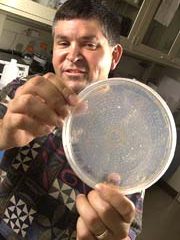Life Sciences and Chemistry
Articles and reports from the Life Sciences and chemistry area deal with applied and basic research into modern biology, chemistry and human medicine.
Valuable information can be found on a range of life sciences fields including bacteriology, biochemistry, bionics, bioinformatics, biophysics, biotechnology, genetics, geobotany, human biology, marine biology, microbiology, molecular biology, cellular biology, zoology, bioinorganic chemistry, microchemistry and environmental chemistry.

Strict ethical guidelines on EU funding of human embryonic stem cell research
Today the Commission adopted a proposal for guidelines on EU-funded human embryonic stem cell research. The EU 6th Research Framework Programme (FP6 2003-2006), as adopted by the Council of Ministers and the European Parliament in 2002, allows for the funding of human embryonic stem cell research in relation to the fight against major diseases.
Such research, in particular when it involves the derivation of stem cells from human supernumerary embryos, can only take place within a fra

Key step allowing cell migration
University of North Carolina at Chapel Hill researchers have discovered a prime regulator of the mechanism by which human cells migrate in health and in illness, a process crucial to sustaining life.
Their work helps explain how cells can stick to a surface long enough to pull themselves and move forward and then release that grip so that they can continue and not be anchored to one spot.
Cai Huang, a graduate student about to complete his doctorate in cell and developmental biolo

Scientists uncover amyloid-like proteins in bacteria
Independent research groups have uncovered a new class of proteins, called the chaplins, that function like amyloid fibrils to allow reproductive growth in the bacterium Streptomyces coelicolor. Amyloid proteins are most commonly recognized for their role in Alzheimer’s disease, where they aggregate into insoluble, mesh-like plaques in the brains of Alzheimer’s patients. This finding reveals an unprecedented role for amyloid-like proteins in Gram-positive bacteria.
S. coelicolor i

Sleep deprivation within five hours of learning impairs memory consolidation in mice
Scientists at the University of Pennsylvania have found new support for the age-old advice to “sleep on it.” Mice allowed to sleep after being trained remembered what they had learned far better than those deprived of sleep for several hours afterward.
The researchers also determined that the five hours following learning are crucial for memory consolidation; mice deprived of sleep five to 10 hours after learning a task showed no memory impairment. The results are reported in the May/June i

Abnormal plant shows scientists path to plant, animal development
A pickle-shaped root is revealing how plants develop from embryos to adults and also may hold answers about cancer cell growth.
Purdue University researchers have uncovered nine specific genes that are shut off before plants make the developmental transition from the embryonic stage to adulthood. Results of the latest study are published in the July issue of The Plant Journal.
“We now have data supporting the hypothesis that the gene PKL is a master regulator of genes that pr

Nanotech strategy could create new organs
Scientists from Harvard Medical School and the Massachusetts Institute of Technology have developed a strategy that could one day be used to create functional human organs such as kidneys and livers. They present their research today at the American Society for Microbiology’s conference on Bio- Micro- Nano-systems.
The technique involves creating a network of microscopic tubes that branch out in a pattern, similar to that seen in the circulatory system, to provide oxygen and nutrients